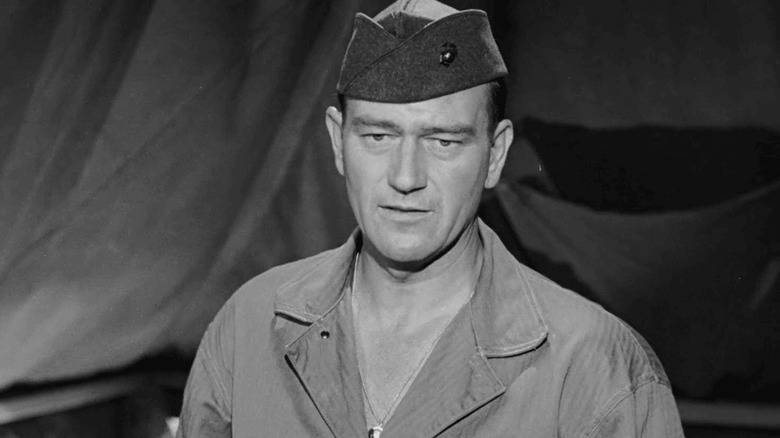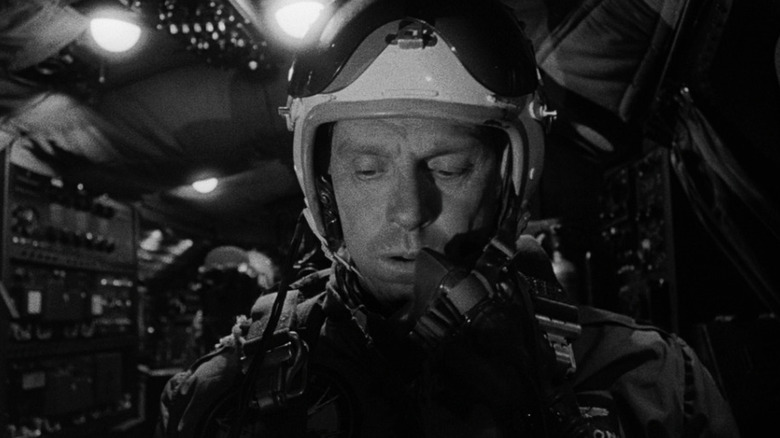John Wayne Turned Down One Of Stanley Kubrick's Best Movies
Wayne rose to fame in the 1930s, and throughout the 1940s and 1950s, built up his reputation as Hollywood's ultimate bastion of masculinity. Wayne didn't possess a lot of range as an actor, typically playing "John Wayne," but his character type proved to be pliable in certain kinds of ultra-popular genre films. He was a Western star and a War Movie star, and his no-nonsense, rah-rah-America personality was eagerly eaten up by audiences. As Wayne rounded the 1960s, however, a lot of his image had begun to tarnish. This was mostly because times were changing, and the kinds of Westerns and war movies that he once headlined became gauche with a new generation. Antiwar sentiment was more popular than the pro-war propaganda that was released in the wake of World War II.
One can see Wayne struggling in his notorious stinker "The Green Berets," a film that attempted to apply old-fashioned WWII sentiments to the Vietnam War. It was insensitive, and critics slammed it. John Wayne was no longer needed as a national symbol.
Indeed, as early as 1964, when Wayne was making films like "The Sons of Katie Elder" and "In Harm's Way," some filmmakers were already looking to exploit Wayne's image for satirical purposes. Wayne's ultra-masculinity wasn't fashionable any longer, and some of the filmmakers of the 1960s were eager to lampoon it. Case in point: Stanley Kubrick once offered Wayne a role in his political satire "Dr. Strangelove, or: How I Learned to Stop Worrying and Love the Bomb." The story goes that Kubrick wanted his star, Peter Sellers, to play four different roles in the film, but an injury forced him to keep it down to three. Kubrick asked if Wayne would take the fourth role, a B-52 bomber pilot named Major Kong.
Wayne never responded, so Kubrick cast Slim Pickens instead.
Stanley Kubrick asked John Wayne to play Major Kong in Dr. Strangelove
For those unfamiliar, "Dr. Strangelove" is a bleak spoof about nuclear proliferation. A mad American army general named Jack D. Ripper (Sterling Hayden) has become obsessed with the evils of Communism and leaned into kooky conspiracy theories about how Commies are plotting to sap and impurify our precious bodily fluids (!). As such, he circumvents the usual security protocols and launches a nuclear strike against Russia. The film takes place in the span between when Ripper gives the order and the time when the bombs are set to be released.
There are three locations throughout. In Ripper's office, the general tells his paranoid conspiracies to a visiting British officer named Lionel Mandrake (Sellers). In the United States War Room, the President (Sellers) discusses possibilities with dozens of baffled suits, including the blustery Buck Turgidson (George C. Scott). A former Nazi doctor, Doctor Strangelove (Sellers) is also there woth the president, and he has a very strange doomsday contingent of his own.
The third location is on board a B-52 bomber that has received the order to drop its nuclear payload on Russia. Slim Pickens played the bomber's pilot, Major Kong, the role that Sellers was supposed to play. As confirmed by co-screenwriter Terry Southern, in a 2008 interview with Medium, Kubrick actually wrote the role of Major Kong to resemble John Wayne, and wanted Sellers to do something of a John Wayne impersonation. When Sellers dropped out, Kubrick felt he should merely swing for the fences and try to hire the real deal. Southern said that Wayne was approached, but that he "dismissed it immediately." An article in Mental Floss, however, said that Wayne merely never responded.
Evidently, "Bonanza" star Dan Blocker was also asked to play Major Kong, but he turned the script down for being "too pinko," a pejorative slang term for being left-wing. Luckily, Slim Pickens was game, and he played the part well. Famously, Pickens didn't know "Dr. Strangelove" was meant to be a satire, so he played his role completely straight.

